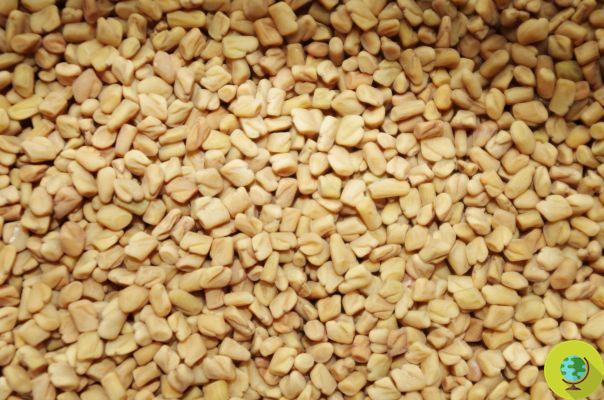
Fenugreek is a plant of the genus Trigonella, a term that refers to the triangular shape of its seeds and to the trigonellin, a characteristic component of this plant. For a long time fenugreek has been used for feeding animals but over time man has discovered its beneficial properties for health.
Don't store avocado like this: it's dangerous
Il fenugreek is a plant of the genus Trigonella, a term that refers to the triangular shape of its seeds and to the trigonelline, a characteristic component of this plant. For a long time fenugreek has been used for animal feed but over time man has discovered its own beneficial properties for health.
This plant was already known in Persia and Ancient Egypt. The cultivation of fenugreek in Europe probably began thanks to the Benedictine monks. Fenugreek blooms from May to June and its fruits are legumes that they contain yellow-brown seeds.
Index
Properties and benefits of fenugreek
Fenugreek is one source of vitamins, in particular contains Vitamin A, Vitamin C and B vitamins. It also provides mineral salts such as football e iron. Fenugreek has numerous beneficial properties. It is antiseptic and anti-inflammatory, has emollient and expectorant properties. It is restorative, tonic and soothing.
It is considered un hypoglycemic food, whose intake could be useful in case of diabetes. Fenugreek also helps reduce cholesterol levels, thanks to its fiber and lecithin content.
Fenugreek is considered useful in case of enlargement of the lymphatic glands, the appearance of acne and pimples which it can counteract thanks to its antiseptic and anti-inflammatory properties, and cellulite. The mucilages present in fenugreek help our skin stay young and hydrated and also contribute to the good functioning of the intestine. In general, fenugreek helps to keep triglyceride, cholesterol and blood sugar levels stable.
When to take fenugreek
The intake of fenugreek is especially recommended when you feel drained and debilitated. In fact, fenugreek is considered a good tonic for our body, as it stimulates the appetite.
Taking fenugreek can be useful during convalescence, in case of inappetence and in the presence of anemia due to iron deficiency, as fenugreek is rich in this substance. Fenugreek extract is recommended to improve digestion. The decoction of fenugreek seeds is considered a valid help in case of hemorrhoids.
Fenugreek can help our body increase the production of red blood cells. In addition, the intake of fenugreek is recommended in menopause to combat hot flashes, insomnia, night sweats and mood swings. Fenugreek infusion is recommended for women to promote milk production while breastfeeding.
Your doctor and herbalist may advise you to take fenugreek in other circumstances as well, depending on your health conditions, on the basis of which they will determine the timing, quantity and method of intake, especially as regards fenugreek in the form of natural food supplement.
Usually the intake of fenugreek as a supplement - liquid extract or capsules - takes place before main meals, but also from this point of view we suggest you follow the advice of your trusted expert. Finally, remember that fenugreek is a supernutrient food which can improve your life.
Where to find fenugreek
in organic food shops and herbalist's shop you can find fenugreek in different forms. In fact, you can buy, for example, fenugreek suitable for the preparation of herbal teas or infusions or fenugreek seeds that you can use for prepare the sprouts at home.
You will also find fenugreek in capsules for sale as a recommended supplement to improve metabolism or fenugreek in the form of liquid extract. The herbalist can recommend the product that best suits your needs.
Marta Albè
Photo source: World Flavorz
Read also:
10 varieties of sprouts to grow at home and their beneficial properties
8 Super Nutritious Foods You're Probably Not Eating


























